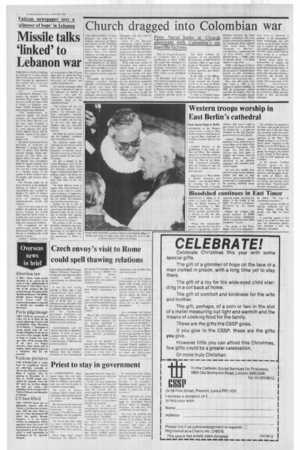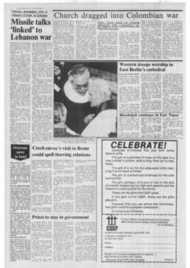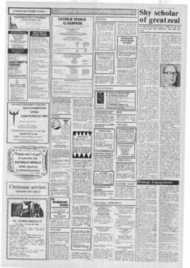Page 2, 16th December 1983
Page 2

Report an error
Noticed an error on this page?If you've noticed an error in this article please click here to report it.
Tags
Share
Related articles
`tighten Security' Call As Pope Packs For Colombia
World Bulletin
Christmas Truce 'not Enough', Argues Cardinal
Priests Face Death In Colombia
Archbishop Hopes For Peace In Colombia
Church dragged into Colombian war
Peter Nares looks at Church alignment with Colombia's six
guerrilla factions.
THE KIDNAPPING of Jaime Betancur, law dean of the Catholic University of Bogota and brother of the Colombian president, shows one of the many ways in which Catholic Church figures have become willing or unwilling participants in Colombia's guerrilla war.
Pope John Paul was among the people 'pleading for the release of Betancur, who was kidnapped Nov. 22 by guerrillas as a way of pressuring the government to free political prisoners and raise wages.
Kidnapping has become a common • practice among guerrillas. In October police said 82 people were being held captive by kidnappers and described 53 as victims of politically motivated groups. In the first nine months of 1983, 20 kidnappers were shot dead by security forces.
Prior to the Betancur kidnapping, church people were already deeply involved in the guerrilla conflicts which have been going on for 20 years in this Smith American country, where 95 per cent of the 27 million people profess Catholicism.
While some farm workers in November were asking one church leader to help protect them from guerrillas, another leader was meeting with farm workers considered sympathetic to guerrillas. While one bishop is on the government-appointed Peace Commission trying to negotiate a settlement to the fighting, several other church people have been accused by military officers of having ties with the guerrillas. There are six guerrilla groups in Colombia with a total membership of about 10,000. The group that kidnapped the 53-year-old Betancur is the National Liberation Army, which regards Cuban President Fidel Castro as its ideological leader.
In November farm workers from central Colombia occupied a church and sent a letter to Cardinal Anibal Munoz Duque of Bogota to dramatise their call for firmer action against a communist guerrilla group in their area. The farm workers say members of the pro-Soviet Revolutionary Armed Forces of Colombia killed at least seven people in November in central Colombia, where fighting between guerrillas and soldiers has been heavy.
In the wake of the killings, relatives and friends of the victims occupied the Catholic church in the town of Puerto Boyaca and sent a delegation to Bogota to meet with government and church leaders.
In letters to Cardinal Munoz Duque and Colombian President Belisario Betancur the farm workers condemned "the cruel killings committed by fanatics of the Communist Party supplied with arms from Cuba, Nicaragua or Moscow". Luis Ramirez, a spokesman for the farm workers, said the guerrilla group — FARC, after its Spanish initials — is losing support in rural areas.
FARC is the largest of the six guerrilla organisations; the army has accused it of being the armed branch of the Columbian Communist Party, an accusation denied by the Communist party.
More than 840 people have been killed in 1983 in the fighting in central Colombia. In 1982 the government offered guerrillas an amnesty, but the majority of the insurgents rejected it. Also in November, Bishop
Jose Serna _of_ .Florencia, _a member of the government's Peace Commission, met with another group of farm workers said to support the guerrillas. The meeting was arranged by Fr Gonzalo Lopez, a priest who has been acting as a mediator between warring factions.
Bishop Serna asked the farmworkers to support the Peace Commission's efforts to pacify and develop the region. In other parts of the country. priests also have been playing a mediating role between the government and guerrilla groups. But in some parts of the nation, church-state relationships have soured over accusations that military officers are involved in killing innocent people in their anti-guerrilla campaigns.
blog comments powered by Disqus









